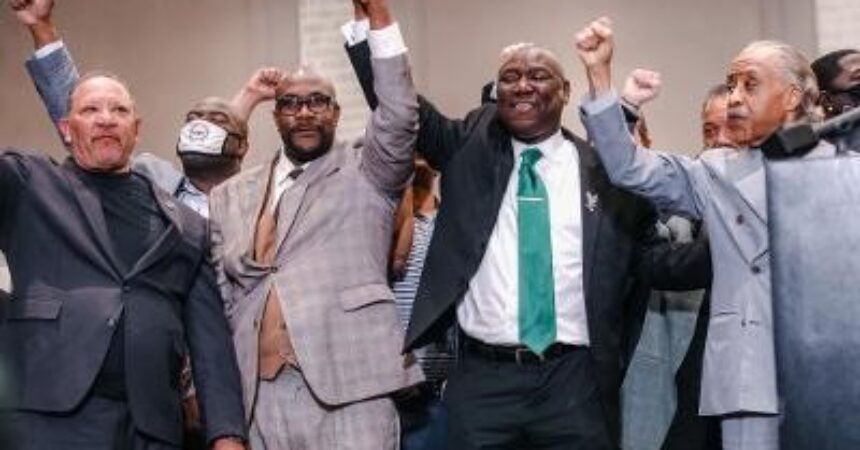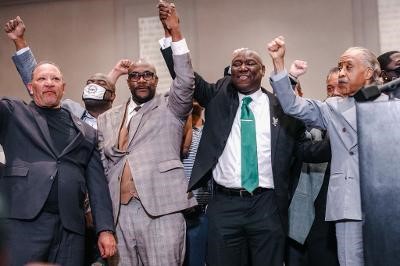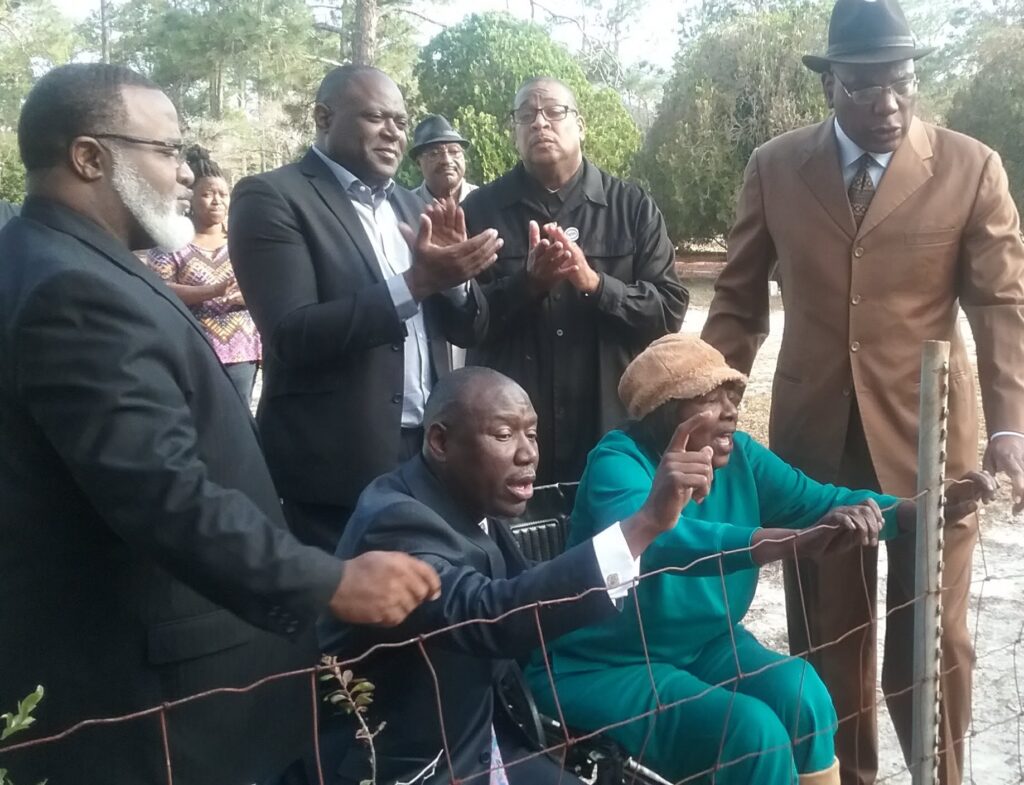
Crump: Law in George Floyd’s honor should be next move against discrimination

Photo courtesy Ben Crump

Photo by St. Clair Murraine
By St. Clair Murraine
Outlook staff writer
Every time civil rights attorney Benjamin Crump was asked what’s next after former Minneapolis police officer Derek Chauvin was convicted for the death of George Floyd, his answer has been the same.
The wording might be different, but the gist and importance remained on one point – federal law is needed to make police officers across the country accountable for their actions.
“Let this be the precedent where we overcome systematic racism and oppression and we are a better people,” Crump said during a press conference that followed the guilty verdict last Tuesday after three weeks of trial.
Five days later on the Sean Pittman Show last Sunday in Tallahassee, Crump said the verdict could be the first step to getting federal legislation through the George Floyd Justice in Policing Act. In March, the House passed the bill that was introduced in February, but it has since languished in the Senate.
“To make it a huge victory for everybody, we’ve got to get this legislation passed to have institutional change and reform to change the culture and behavior of policing in America,” Crump said on Pittman’s radio show. “That is so necessary if we want to stop some of these hastags. That’s where we go from here.”
Crump broke into national prominence when he represented the family of Trayvon Martin, who was shot by George Zimmerman in 2012. Since then, he’s been on the frontline defending families of the victims of police shootings across the country.
However, not every case handled by the Lumberton, N.C., native who graduated from FSU law school in 1995 and has since made Tallahassee his home, got national headlines. In December 2017 he traveled to Camilla, Ga., where he held a press conference to a segregated Oakview Cemetery. Within a month of Crump’s visit with his pastor Rev. RB Holmes at his side, a fence that separated Blacks and Whites in their final resting place was removed.
Crump called the verdict against Chauvin “a victory for those who champion humanity over inhumanity; those who champion justice over injustice, those who champion morals over immorality.
“America let’s lean into this moment,” he added before rattling off a list of victims who died at the hands of police, including BreonnaTaylor, Ahmaud Arbery,, Jacob Blake, Anthony McClain, Walter Scott and Terence Crutcher.
“Let this be the precedent where we overcome systematic racism and oppression and we are a better people.”
Rev. Al Sharpton, who delivered the eulogy at the funeral of Daunte Wright, another victim of police shooting, expressed optimism that the change in policing tactics that Crump and others advocate, might soon come.
Sharpton, who is also president of the National Action Network, made his point by reflecting on the civil rights struggles in the South. He specifically referred to the bus boycott in Montgomery, Ala., and how it took the Civil Rights Act of 1964 to protect Blacks against discrimination almost a decade after the boycott started.
“If you believe in justice it’s time for the federal government to reflect the will of the people,” Sharpton said, while eulogizing Wright. “The time has come for America to stand up and bring a new day to where we don’t have to explain to our children what to do when the police stop you.
“It’s time to bring a new day when we don’t have to video tape when we see a badge but where we know they are there to serve and protect; not treat us like we’ve been convicted. The time has come for police to understand they are not above the law.”
City commissioner Dianne Williams-Cox reiterated the call for federal intervention to change the way that police have been taking the lives of Blacks. It’s beyond municipal and state government, she said.
“If we can get the Senate to get busy, we would get moving because when you leave it up to state and cities to do their own thing, you’re going to a hard cause,” Williams-Cox said. “If you keep doing what you’ve been doing you’re going to get the same results.”
Meanwhile, Williams-Cox said parents have to continue having the talk with their Black children. She is mother to three grown male children. The talk about how to respond to police if they are stopped is different for each one, she said.
The youngest of her sons who has a sports car was stopped twice “in a neighborhood they (police) don’t believe he should be in,” she said.
Her rule of thumb to her sons is “Do what they say to do so everybody can come home,” he said.
While the taking of Black lives by police is become too frequent, the practice isn’t new. Historian Larry Rivers, a FAMU professor, likened the shootings to what escaped slaves faced at the hands of slave patrols during the 1800s.
“If you were an enslaved person and you got caught you took your life in your own hands if you were caught by the slave patrol,” Rivers said. “Black men, when they are stopped in today’s society, they put their lives in the hands of police and lord knows what can come out of that. So there are always parallels to what is happening now.”
During last Sunday’s appearance on the Pittman show, Crump said he is convinced that an equitable system of justice will come for Blacks.
“It’s a war,” he said. “We may lose a skirmish or two but we’re going to win this war. I believe that with such certainty in all my heart.”
Immediately after the verdict, Crump called it historical, being the first time a Minnesota police officer has been convicted for deadly use of force.
Floyd died after Chauvin kept his knee on his neck for more than nine minutes.
The victory in court was “not just for the legacy of George Floyd, but for the legacy of America,” Crump said. “The legacy of trying to make America for all Americans so that George Floyd’s victory and America’s quest for equal justice under the law will be intertwine.”
Then he added: “America, let’s frame this moment as a moment where we are finally are getting close to living up to the Declaration of Independence that we hold these truths to be self evident that all men are created equally.”







